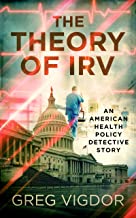The Theory of Irv by Greg Vigdor
Despite how important it is, the way American public health policy is often discussed in media and literature is often much too complex and inaccessible for most of the population. With it being so closely tied to our divisive national politics, this often creates issues, issues that Greg Vigdor tackles in his medical mystery novel The Theory of Irv.
“I wrote my book based on the notion that readers might appreciate learning about health care through fun more than serious lectures,” said Vigdor. “I use entertainment as the means to educate and spread important policy messages about health care.”
The Theory of Irv combines illuminating insight into public health with a riveting detective story. As the threat of a pandemic looms, Irv Tinsley must confront many obstacles, even the American healthcare system itself, as he unravels and solves the public health danger before it’s too late.
Vigdor gave us a look behind the scenes into both the writing of the book and his own experience in this interview:
Q: Why did you write this book?
A: I’ve wanted to write a novel from the time of my childhood. When I left my last leadership post in 2019, it seemed like a good time to finally do it. It seemed best to write about things I really know, and that would be health care. This seemed even more attractive with my realization I had strong views about the health care system that I wanted to get out into the public marketplace of ideas.
Q: You could have written a straight non-fiction informational book about public health policy, but you didn’t. Why did you choose to write this book as a mystery novel?
A: Originally I started writing two books — one the fictional tale and the second more of a US health policy treatise. I was having far more fun writing the fictional tale and that led me to the notion that readers also might appreciate learning about health care through fun more than serious lecture. I incorporated the two books into one, with a design premise to use entertainment as the means to educate and spread important policy messages about health care.
Q: What are the key themes you wanted to get across to readers?
A: First, the history — there are reasons health care is this way, rooted in failures to build a true system. People need to know important lessons from the past, like the Committee on the Cost of Medical Care.
Second, there are consequences for health care’s failures. For all its miracles, it too frequently fails us individually. It carries great social costs that affect us all, including paradoxically that its high cost makes it hard to invest in creating “health” broadly.
Third, there are solutions, but we must move outside of the typical boxes to find ideas that will work. The 10 point reform plan in the novel is intended to get people thinking about very different solutions than the usual ideas tossed around.
Q: How does your background- what you did, what you observed, and what you learned — give credence to your theories on public health?
A: I’ve worked in health care since I was a teenager and know the system exceptionally well from working across many facets of it. I have also engaged in the policy and political battles within the novel, at the federal and various state levels. Perhaps most important, I’ve taken risks to bring about major change. I led many of these in my time as CEO of the Washington Health Foundation (www.washhealthfoundation.org). I am proud of what we did and believe we were on the right track, even without enough time or money to complete the task. Meanwhile, the health care system still needs to be fully reformed. This book continues this journey.
Q: What is the biggest challenge our country must overcome to fix what you regard as a broken health care system?
A: Both the complexity and the amount of money now caught up in health care are staggering, and each issue makes change harder to achieve. The biggest challenge is that most real change has become tied up in our national divisive politics. There is far more agreement on fixing things out there, yet the fights over ideology and labels makes it hard to find a way forward. We need to make the public smarter about the issue, and this book aims to help with that challenge, and why part of it is about politics.
Q: Have you ever pursued writing other books?
A: I’ve done a lot of writing over the years, but this is my first book.
Q: What is your next project?
A: The sequel to this novel is under development. It will be another health care detective mystery and will offer my non-partisan policy insights on health care quality practices and our systemic approach (or not) to public health threats like pandemics. The current draft title is The Covid Murders.
The Theory of Irv is available for purchase here and here.
About Greg Vigdor:
Greg Vigdor has spent four decades working within the health care system, trying to forge big and meaningful change. Now, he is writing about these issues as an author of this novel and a monthly blog as President of the Washington Health Foundation, sharing his unique and practical ideas for improving health and health care for all Americans.
Buy this Book!
Amazon





Thanks for sharing this valuable piece of information with us.